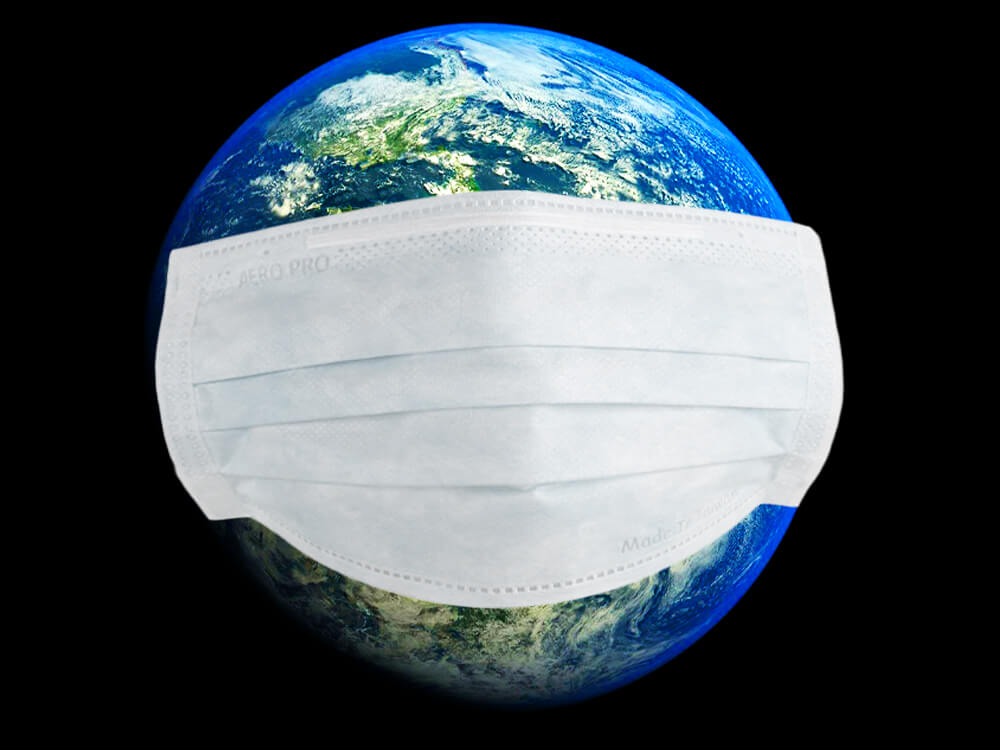Earth Day 2020 is a special one. With half a century of Earth Days celebrations behind us, we’re approaching a new level of urgency in our environmental crisis.
This global pandemic has reminded us that we live in an interconnected system.
Just like a clear signal showing humanity’s dependency on a healthy biosphere.
Earth Day 2020 – Science First
We finally see how many factors driving the global climate change are indirectly assisting the contagious disease.
Deforestation, supposedly in service of agriculture, it is one of the largest culprits to the baking of the planet.
Habitat loss too, by forcing animal migration in human areas, which in turn increases the chances of viral pathogens spreading to human hosts.
Raising livestock in industrial farming systems is another chief source of greenhouse gas emissions and a source of pathogen spillover from animal to human populations.
Global Warming Contributors
And our reliance on fossil fuels – another significant contributor to global warming – causes reckless air pollution that exposes us to all sorts of respiratory infections.
We harm our environment, and our environment hurts us back.
The more we understand about these invisible connections, the more we understand the need to protect the plant and animals.
As by protecting them, we protect people, our health, communities, and even our economic prosperity.
Earth Day 2020 Economic Impact
One of the most discussed subjects amongst environmental scholars is about how the ecosystem destabilisation and wildlife habitat destruction are linked to the current global pandemic.
To the economists, the COVID-19 pandemic has thrown the world into a collective moment of disruption.
Regaining sustainable economic prosperity will require, post-pandemic, a long and hard look at how we interact within the environment.
Just as COVID-19 has, if left to follow the existing course, the climate crisis will destabilise the world beyond recognition.
At this critical mark – ‘Earth Day 2020’, the 50th anniversary of Earth Day – we must get together and embark on sustainable development.
Invest in sustainable systems designed to keep the environment, animals and people safe in the face of uncertainty.
– Shift the world to 100 per cent renewable energy sources.
– Globally care about animal welfare and wildlife.
– Stop industrial farming.
– Put an end to the fashion industry’s polluting, cruel, and unsustainable practices.
Are We The Virus?
Many argue that Coronavirus shutdowns are the Earth Day 2020 gift to the environment.
From the start of the industrial revolution, we’ve begun scarring the planet in ways that can be seen in the depth of the Earth’s crust.
Credit: NASA
On the first Earth Day, 50 years ago, nearly 20 million people marched asking for a change in the way we interact and impact this planet.
We knew back then that different approach was needed.
Fifty years later, we are faced with a worse version of the initial choice.
We still can take that conscious path towards a sustainable future, or let the planet do it for us. And it will.
Nature Fights Back
The environment fights back by forcing ourselves and our neighbours to a global isolation state. It shouts: ‘Stay away from me!’
The hampering of the global economic ‘train’ has indirectly improved air quality in cities across the world.
Moreover, in the wake of the global lockdown animals have begun to reclaim their land and the once human-dominated spaces.
Forests, beaches, rivers and oceans are claimed back by their rightful owners.
| Most-Read Articles |
In fact, we are not isolated from us; we’re separated from nature until we sort out this ultimate problem: the environment and its sustainability.
And if we can, the planet will solve it.
As you can see, nature’s response to our societal contraction is impressively efficient and fast.
This time, we’re somewhat lucky to escape unscathed. But, what’s going to be next time?
The COVID-19 pandemic has brought to the surface a perennial narrative.
It states that we, humans, are the real virus infecting the planet and coronavirus is, in fact, the Earth’s vaccine.
Depending on the lens you’re looking at it, that might be true as well.
However, as we debate who’s the virus and who’s the vaccine and recommendations for what the world should look like after pandemic, we must not forget what got us here.
Only then we can embark on a systematic change, pushing together towards a sustainable world and a cleaner future.
WTVOX – ‘Voicing the Future of Fashion’
For more similar content and lightning-quick updates delivered directly to your inbox subscribe to our weekly newsletter.
For daily news in sustainable fashion, innovation, conscious beauty and lifestyle follow us on social media: Instagram, LinkedIn, Facebook, Twitter.
Finally, if you want to interact with thousands like you, join your tribe on the Future of Fashion Group.
A decade of fashion; here’s to the next one.The past decade has been turbulent – and defining – for fashion: child labour, climate crisis, gender inequality, animal cruelty, and reckless plastic pollution, just to name a few. With the COVID-19 pandemic, the beginning of this decade does not look too good either. That’s why finding media that reports with rigour and integrity at heart is difficult in critical times. Finding media that informs all, regardless of where they live or if they can afford to pay, is even harder. In these times, independent fashion media magazines are increasingly silenced by commercial ownership and social media misinformation. So far, your unceasing support has allowed us to keep delivering trustworthy, relevant, high-quality content. Your support allowed us to uphold our editorial independence and ensure honest journalism, free from commercial ownership or political bias. We are deeply grateful for your generosity and continue to count on your support. Thank you. |






